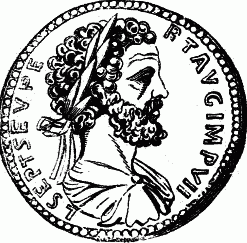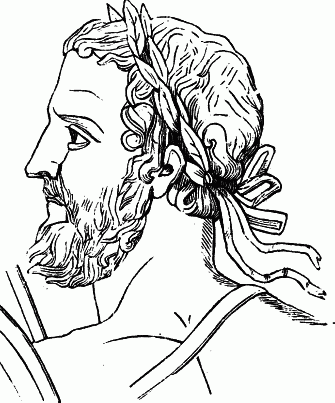
Septimus Severus was an able Emperor, and reigned a long time. He was stern and harsh, as was needed by the wickedness of the time; and he was very active, seldom at Rome, but flashing as it were from one end of the empire to the other, wherever he was needed, and keeping excellent order. There was no regular persecution of the Christians in his time; but at Lyons, where the townspeople were in great numbers Christians, the country-folk by some sudden impulse broke in and made a horrible massacre of them, in which the bishop, St. Irenæus, was killed. So few country people were at this time converts, that Paganus, a peasant, came to be used as a term for a heathen.
Severus was, like Trajan and Hadrian, a great builder and road-maker. The whole empire was connected by a network of paved roads made by the soldiery, cutting through hills, bridging valleys, straight, smooth, and so solid that they remain to this day. This made communication so rapid that government was possible to an active man like him. He gave the Parthians a check; and, when an old man, came to Britain and marched far north, but he saw it was impossible to guard Antonius' wall between the Forth and Clyde, and only strengthened the rampart of Hadrian from the Tweed to the Solway. He died at York, in 211, on his return, and his last watchword was "Labor!" His wife was named Julia Domna, and he left two sons, usually called Caracalla and Geta, who divided the empire; but Geta was soon stabbed by his brother's own hand, and then Caracalla showed himself even worse than Commodus, till he in his turn was murdered in 217.

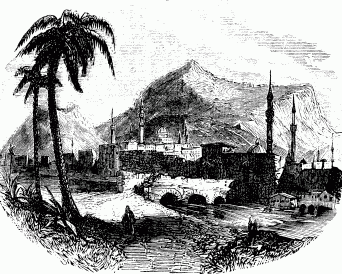
His mother, Julia Domna, had a sister called Julia Sæmias, who lived at Antioch, and had two daughters, Sæmias and Mammæa, who each had a son, Elagabalus—so called after the idol supposed to represent the sun, whose priest at Emesa he was—and Alexander Severus. The Prætorian Guard, in their difficulty whom to chose Emperor, chose Elagabalus, a lad of nineteen, who showed himself a poor, miserable, foolish wretch, who did the most absurd things. His feasts were a proverb for excess, and even his lions were fed on parrots and pheasants. Sometimes he would get together a festival party of all fat men, or all thin, all tall, or short, all bald, or gouty; and at others he would keep the wedding of his namesake god and Pallas, making matches between the gods and goddesses all over Italy; and he carried on his service to his god with the same barbaric dances in a strange costume as at Emesa, to the great disgust of the Romans. His grandmother persuaded him to adopt his cousin Alexander, a youth of much more promise, who took the name of Severus. The soldiers were charmed with him; Elagabalus became jealous, and was going to strip him of his honors; but this angered the Prætorians, so that they put the elder Emperor to death in 222.
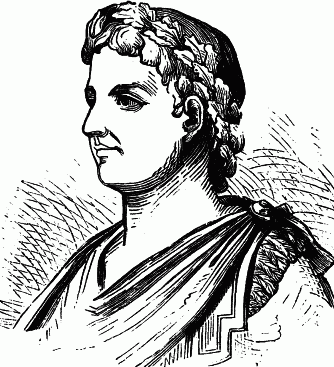
Alexander Severus was a good and just prince, whose mother is believed to have been a Christian, and he had certainly learned enough of the Divine Law to love virtue, and be firm while he was forbearing. He loved virtue, but he did not accept the faith, and would only look upon our Blessed Lord as a sort of great philosopher, placing His statue with that of Abraham, Orpheus, and all whom he thought great teachers of mankind, in a private temple of his own, as if they were all on a level. He never came any nearer to the faith, and after thirteen years of good and firm government he was killed in a mutiny of the Prætorians in 235.
These guards had all the power, and set up and put down Emperors so rapidly that there are hardly any names worth remembering. In the unsettled state of the empire no one had time to persecute the Christians, and their numbers grew and prospered; in many places they had churches, with worship going on openly, and their Bishops were known and respected. The Emperor Philip, called the Arabian, who was actually a Christian, though he would not own it openly, when he was at Antioch, joined in the service at Easter, and presented himself to receive the Holy Communion; but Bishop Babylas refused him, until he should have done open penance for the crimes by which he had come to the purple, and renounced all remains of heathenism. He turned away rebuked, but put off his repentance; and the next year celebrated the games called the Seculæ, because they took place every Seculum or hundredth year, with all their heathen ceremonies, and with tenfold splendor, in honor of this being Rome's thousandth birthday.
Soon after, another general named Decius was chosen by the army on the German frontier, and Philip was killed in battle with him. Decius wanted to be an old-fashioned Roman; he believed in the gods, and thought the troubles of the empire came of forsaking them; and as the Parthians molested the East, and the Goths and Germans the North, and the soldiers seemed more ready to kill their Emperors than the enemy, he thought to win back prosperity by causing all to return to the old worship, and begun the worst persecution the Church had yet known. Rome, Antioch, Carthage, Alexandria, and all the chief cities were searched for Christians. If they would not throw a handful of incense on the idol's altar or disown Christ, they were given over to all the horrid torments cruel ingenuity could invent, in the hope of subduing their constancy. Some fell, but the greater number were firm, and witnessed a glorious confession before, in 251, Decius and his son were both slain in battle in Mæsia.
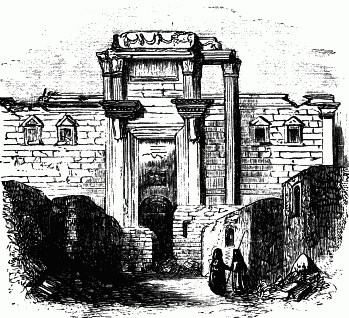
The next Emperor whose name is worth remembering was Valerian, who had to make war against the Persians. The old stock of Persian kings, professing to be descended from Cyrus, and, like him, adoring fire, had overcome the Parthians, and were spreading the Persian power in the East, under their king Sapor, who conquered Mesopotamia, and on the banks of the Euphrates defeated Valerian in a terrible battle at Edessa. Valerian was made prisoner, and kept as a wretched slave, who was forced to crouch down that Sapor might climb up by his back when mounting on horseback; and when he died, his skin was dyed purple, stuffed, and hung up in a temple.
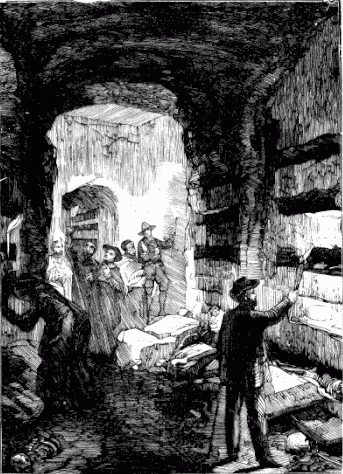
The best resistance made to Sapor was by Odenatus, a Syrian chief, and his beautiful Arabian wife Zenobia, who held out the city of Palmyra, on an oasis in the desert between Palestine and Assyria, till Sapor retreated. Finding that no notice was taken of them by Rome, they called themselves Emperor and Empress. The city was very beautifully adorned with splendid buildings in the later Greek style; and Zenobia, who reigned with her young sons after her husband's death, was well read in Greek classics and philosophy, and was a pupil of the philosopher Longinus. Aurelian, becoming Emperor of Rome, came against this strange little kingdom, and was bravely resisted by Zenobia; but he defeated her, made her prisoner, and caused her to march in his triumph to Rome. She afterwards lived with her children in Italy.
Aurelian saw perils closing in on all sides of the empire, and thought it time to fortify the city of Rome itself, which had long spread beyond the old walls of Servius Tullus. He traced a new circuit, and built the wall, the lines of which are the same that still enclose Rome, though the wall itself has been several times thrown down and rebuilt. He also built the city in Gaul which still bears his name, slightly altered into Orleans. He was one of those stern, brave Emperors, who vainly tried to bring back old Roman manners, and fancied it was Christianity that corrupted them; and he was just preparing for a great persecution when he was murdered in his tent, and there were three or four more Emperors set up and then killed almost as soon as their reign was well begun. The last thirty of them are sometimes called the Thirty Tyrants. This power of the Prætorian Guard, of setting up and pulling down their Emperor as being primarily their general, lasted altogether fully a hundred years.
